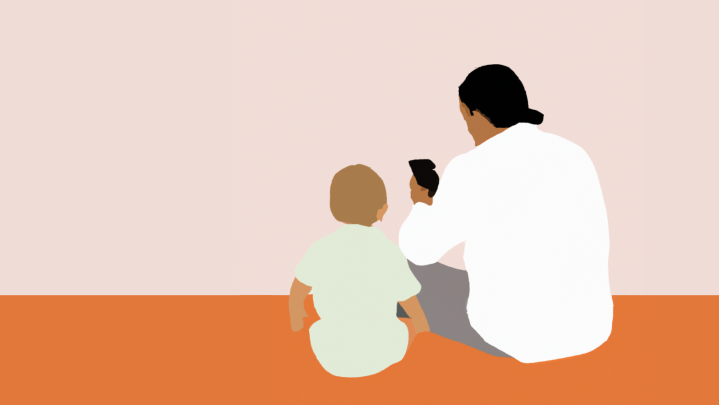WELLNESS OP-ED
What to expect when you’re expecting your parents to pay attention

A recent talk on ‘Anxiety and the Digital Child’ highlights the centrality of technological devices, such as the phone, in our lives and its impact on the development of self-efficacy in children.
Earlier this term I attended a talk on “Anxiety and the Digital Child” by Luke Lamprecht, a child protection and development specialist based in Johannesburg.
I thoroughly enjoyed his no-nonsense approach, knowledge of the inner city, and the empathy he displayed for kids and parents alike in navigating the world of technology.
He made some helpful connections between some old psychological findings on attachment styles and the rise of both tech exposure and its impact on children, focusing on related anxiety.
My takeaway from the talk was that the centrality of technological devices, such as the phone, in our lives is eroding the development of self-efficacy in children.
Lamprecht started his talk introducing the audience to what is popularly known as the “Still-Face Experiment”.
In 1975, a study was done with mothers and children; the idea was to evaluate the quality and type of attachment between mother and child.
“The baby is in a seat facing her mother and the mother is talking, smiling and making eye contact, and the infant responds by vocalising, smiling back and pointing at things in the room.
“At one point, the mother turns away and when she faces the baby, what the infant sees is a still, unsmiling face. The baby goes into overdrive to re-engage her or his mother – doing all the things that previously have garnered attention – but no go; the mother’s face remains still.
What you see on the video is heartbreaking: When the infant realises that while her mother is there, she is also somehow gone, the baby begins to melt down.
“She looks away, she waves her arms in protest, slumps in the seat, and then begins to wail. It’s at that point that the mother relaxes her face and starts interacting with the infant again, re-establishing and repairing the connection. It’s worth noting that the baby is relatively wary and that it takes a bit of time for her to recover.”
How often has such interaction happened to us? You are having a conversation with someone, and they glance down at their phone, for no real reason other than the fact that the phone is lying on the table. Their face changes, the flow of conversation is interrupted.
It is a disruptive moment, and can be unsettling, although, if you are a secure person, you know it is not about you.
But imagine you are a child, a toddler, a baby, who is still learning about norms of conversation and listening through imitating what they see around them.
They are at the centre of their universe, so all changes that happen in their environment, they experience as happening to them, because of them.
They are testing the efficacy of their actions all the time: If I drop this banana, what will happen? Will it make a weird sound? Will it make Mom angry? Will it make her laugh? Will it make the dog come?
Children often experience themselves as what I call “Lord-Wizards-of-The-Universe”. It makes them curious and creative, but it also makes them vulnerable, because it is not in line with reality.
The job of growing up is learning about one’s relationship to reality, which includes other people – and finding our place within that shared sense of reality.
Back to the experiment, while the findings show “the importance of mother-child attachment, it also reveals something else of vital importance… Is the baby experiencing a loss of attachment or a loss of agency?”
Agency refers to the subjective awareness that one is initiating, executing and controlling one’s own actions in the world.
“When we ‘still-face’ our children by ignoring their expressions of emotion, for example, they may experience a loss of agency.”
I would argue that it is not only ignoring our children’s expressions of emotion which could lead to a loss of agency, but rather inappropriate or incoherent responses in run-of-the-mill interactions that would erode their sense of agency.
When we glance down mid-interaction, our response is to what we’ve just seen on the screen, not what is happening right in front of us.
Our face that may have been smiling at them a second ago could now be, all of sudden, blank, still. Or angry, or frowning, or laughing even.
Whatever it is, it is an incoherent contextual response to our children. By engaging in tech, without mediating what we are doing on the device in front of them, we interrupt a pattern they are trying to learn.
Not only is this confusing but it also makes it hard for them to understand how to regulate themselves.
Because our responses seem unrelated to reality, they will learn that their responses do not need to be related to reality either, or they simply will not know how to respond.
And how do you feel when you don’t know how to respond, or you don’t understand a response? Anxious. The mental health crisis of our age.
Peter Gray, an American researcher on the importance of independent play, notes that people of all ages who have “a strong internal locus of control, that is, a strong sense of being able to solve their own problems and take charge of their own lives, are much less likely to suffer from anxiety and depression than those with a weaker internal locus of control.
“Obviously, however, to develop a strong internal locus of control a person needs considerable experience of actually being in control.”
I would argue that it is not possible to develop a sense of being in control if one’s caregivers (among other things) consistently offer up incoherent responses because of the third “object” in the room: The device.
The conclusion to Lamprecht’s talk, like many of the articles I’ve been reading on tech, children and anxiety, is a simple call to action.
Be intentional; model good behaviour. Just because roads are dangerous, we don’t take away the roads; we teach our kids how to cross the road safely.
It should be the same for devices. They are here, they are part of our way of being in the world. But we must control them, do not let them control us.
Simple things like banning phones at tables would help to repair interactions. Conversations could flow, vocabulary could grow, our kids and partners and friends would be able to know that we are listening, we are trying to understand.
And what makes you feel less anxious? When you feel your environment is predictable, and you feel understood. DM
Hannah Botsis holds a PhD in critical narrative psychology from the University of the Witwatersrand. Her most recent book ‘Subjectivity, Language and the Postcolonial: Beyond Bourdieu in South Africa’, was published by Routledge in 2018. She writes a weekly column, offering down-to-earth insights into family life, social issues, and cultural critique, at Substack.com.



















 Become an Insider
Become an Insider
Comments - Please login in order to comment.